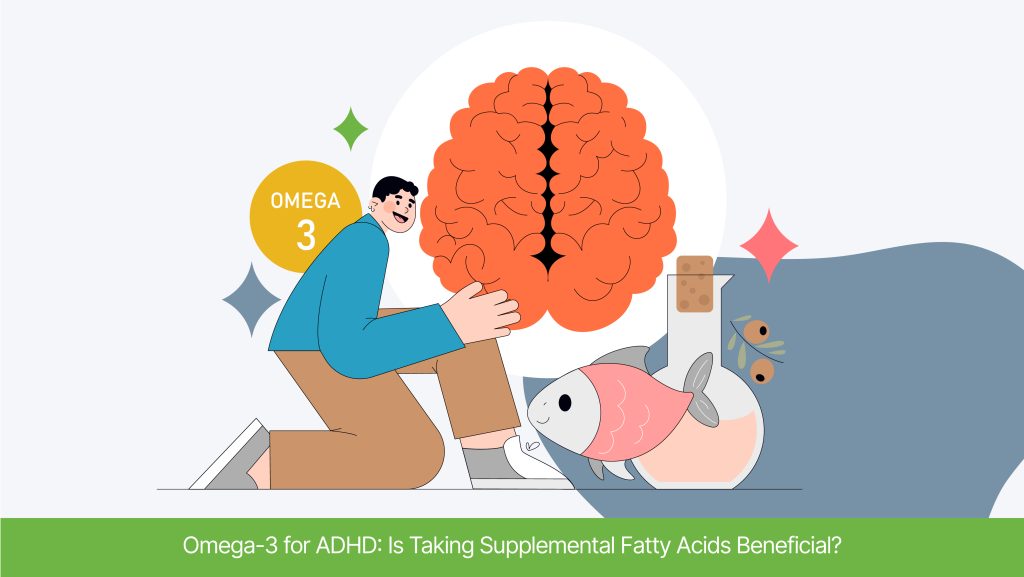Attention-deficit hyperactivity disorder (ADHD) is a neurodevelopmental condition characterized by symptoms including inattention, impulsivity, and hyperactivity. While stimulant medications and behavioural therapy remain first-line treatments, many people also explore adjunctive or complementary strategies. Recently, omega-3 fatty acids have begun to attract attention as a nutritional supplement that may be beneficial. What does the evidence say about omega-3s and ADHD, how do they help people with attention challenges, and are there potential risks?
Omega-3s and Why They Matter
Omega-3 fatty acids are essential polyunsaturated fats that the body cannot synthesize, so they must be obtained from diet (or supplements). The key long-chain omega-3s are eicosapentaenoic acid (EPA) and docosahexaenoic acid (DHA). These fats are crucial for cellular membrane integrity, neuronal signaling, and anti-inflammatory regulation in the body and brain.
From a cardiovascular perspective, the American Heart Association recommends consuming two servings of fatty fish per week (approximately six ounces cooked) to promote heart health and reduce risk of cardiovascular disease. Fatty fish are great natural sources of omega-3s. They also note that omega-3 supplements may modestly lower triglycerides and support heart function under specific conditions.
Given these general health benefits, researchers have asked: can omega-3s also help with ADHD symptoms?
Evidence on Omega-3s in ADHD: What Do We Know So Far?
Lower Omega-3 Levels in People with ADHD
Some observational and cross-sectional studies suggest that people with ADHD may have lower blood levels of omega-3 fatty acids compared to individuals without ADHD. This correlation has led to the hypothesis that increasing omega-3 levels might improve symptoms.
Symptom Improvements: Inattention, Hyperactivity, Impulsivity
Meta-analyses and clinical trials show modest benefits of omega-3 supplementation on ADHD symptoms:
- Improvements are most frequently observed in attention and concentration (reducing inattention).
- Some studies also find modest reductions in hyperactivity and impulsivity.
- The magnitude of benefit tends to be small to moderate. Many meta-analyses caution that omega-3s are not a stand-alone treatment but may serve as extra support.
The ADDitude magazine site offers a helpful and accessible summary of many trials and mechanisms.
Mechanisms: How Might Omega-3s Help?
There are possible biological pathways by which omega-3s could influence brain function relevant to ADHD:
- Neurotransmitter regulation
Omega-3s, especially EPA and DHA, may influence the synthesis and regulation of dopamine and serotonin, two neurotransmitters implicated in ADHD. - Membrane fluidity and neuronal signaling
DHA is a key component of neuronal membranes, helping maintain optimal function of receptors, ion channels, and synaptic signaling. - Anti-inflammatory and neuroprotective effects
Omega-3s help resolve inflammation through specialized molecules (resolvins, protectins). Given growing interest in the role of neuroinflammation in psychiatric/neurodevelopmental disorders, this is a relevant mechanism. - Vascular support and brain blood flow
By supporting vascular health, omega-3s may help maintain optimal cerebral blood flow and microvascular integrity, potentially benefiting cognitive performance.
While these mechanisms are biologically plausible, they remain hypotheses and are not definitive proof.
Benefits Beyond ADHD: Cardiovascular and General Health Gains
Adopting an omega-3–rich diet or supplementation may also yield broader health benefits, which is especially relevant for adults with ADHD or people at cardiometabolic risk.
- Lowering triglycerides
Omega-3s can lower triglyceride (blood fat) levels, especially when taken in higher amounts (about 2–4 grams per day). - Reducing blood pressure
Taking around 3 grams per day of EPA and DHA (types of omega-3s) may slightly lower both the top (systolic) and bottom (diastolic) blood pressure numbers. - Protecting blood vessels and reducing inflammation
Omega-3s can make blood less likely to clot, improve how blood vessels work, and reduce inflammation, all of which help protect the heart and circulation. - Lowering risk of heart disease and death
Studies show that people who consume more omega-3s have a lower risk of dying from heart disease, sudden heart problems, or any cause, especially if they already have heart disease.
In short, even if the ADHD-specific benefits are modest, the overall health profile makes omega-3 intake interesting for many.
Risks, Limitations, and Caveats
When writing about nutritional supplements, it’s essential to be transparent about limitations and safety:
- Modest effect sizes and heterogeneity
The ADHD literature is mixed. Some trials find negligible impact; however, the consensus is that omega-3s may help but are not a substitute for evidence-based ADHD therapies. - Treatment can be detrimental to some
EPA treatment improves cognitive symptoms in ADHD youth, especially if they have a low baseline endogenous EPA level, while youth with high EPA levels may be negatively affected by this treatment. - Supplement regulation and quality control
Fish oil and other omega-3 supplements are not regulated like prescription drugs. Purity, dosage, and contaminants (e.g. heavy metals) vary by brand. Always choose third-party–tested products. - Bleeding risk
At higher doses, omega-3s may slightly increase bleeding risk, especially in those on anticoagulant or antiplatelet medications. - Drug interactions
People who use medications (e.g., stimulants, SSRIs, blood pressure drugs) should consult a doctor before starting omega-3s. - Not a replacement for proven ADHD treatments
It’s important to note that stimulant or nonstimulant pharmacotherapy, behavioural therapy, and lifestyle interventions remain first-line for moderate to severe ADHD.
While omega-3 supplementation is not a magic cure for ADHD, the existing evidence supports potential modest improvements in attention, hyperactivity, and impulsivity when used as an adjunct. The general cardiovascular and anti-inflammatory benefits of omega-3s offer additional appeal, especially for adults juggling multiple health goals.
As always, anyone considering starting omega-3s, especially children, pregnant people, or those on medications, should consult a qualified health care provider or clinical nutritionist. The decision should align with the person’s overall ADHD treatment plan and safety profile.
References
Chaddha, A., & Eagle, K. A. (2015). Omega-3 fatty acids and heart health. Circulation, 132(22).
https://doi.org/10.1161/circulationaha.114.015176
Chang, J. P., Su, K., Mondelli, V., Satyanarayanan, S. K., Yang, H., Chiang, Y., Chen, H., & Pariante, C. M. (2019). High-dose eicosapentaenoic acid (EPA) improves attention and vigilance in children and adolescents with attention deficit hyperactivity disorder (ADHD) and low endogenous EPA levels. Translational Psychiatry, 9(1).
https://doi.org/10.1038/s41398-019-0633-0
Consuming about 3 grams of omega-3 fatty acids a day may lower blood pressure. www.heart.org. (n.d.).
Hallowell, E., Marner, K., & Adler, T. (2006, December 12). Can a Daily Fish Oil Supplement Help Curb Symptoms of ADHD? ADDitude; ADDitude.
https://www.additudemag.com/fish-oil-for-adhd-symptoms/
National Institutes of Health. (2023, February 15). Omega-3 Fatty Acids. Nih.gov.
https://ods.od.nih.gov/factsheets/Omega3FattyAcids-HealthProfessional/



